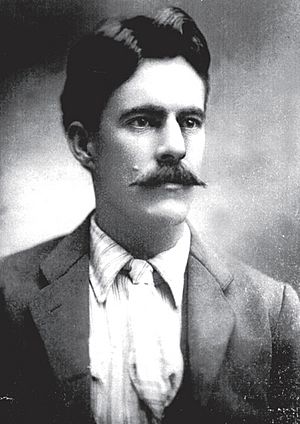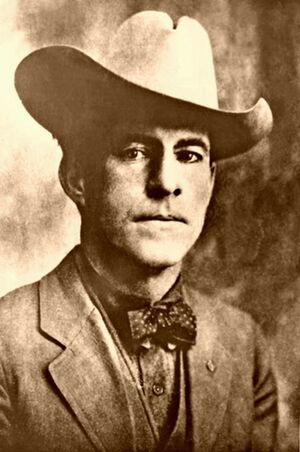Harry C. Wheeler facts for kids
Quick facts for kids
Harry C. Wheeler
|
|
|---|---|
 |
|
| Birth name | Harry Cornwall Wheeler |
| Born | June 23, 1875 Jacksonville, Florida, United States |
| Died | December 17, 1925 (aged 50) Bisbee, Arizona, United States |
| Allegiance | |
| Service/ |
|
| Battles/wars | Spanish–American War |
| Other work | Arizona Ranger, Sheriff |
Harry Cornwall Wheeler (born July 23, 1875 – died December 17, 1925) was a well-known lawman in Arizona. He was the third captain of the Arizona Rangers, a group of law enforcers. He also served as the sheriff of Cochise County from 1912 to 1918.
Wheeler is remembered for his role in the Bisbee Deportation in 1917. This event involved the forced removal of about 1,200 miners and their families from Bisbee, Arizona. Many of these people were immigrants. They were sent to New Mexico without proper supplies.
Harry Wheeler was born in Florida and served in both the Spanish–American War and World War I. He was part of the Arizona Rangers from 1903 until the group was disbanded in 1909.
Contents
Life and Law Enforcement Career
Early Life and Military Service
Harry Wheeler was born in 1875 in Jacksonville, Florida. His father, William B. Wheeler, was a Colonel in the United States Army.
In 1897, when he was 22, Harry joined the 1st Cavalry. He fought in the Spanish–American War. He left the army in 1902 with the rank of sergeant.
Joining the Arizona Rangers
Wheeler was known for being a very good shot with both a rifle and a pistol. In 1903, he joined the Arizona Rangers. Just four months later, he was promoted to sergeant.
In 1907, Wheeler became the captain of the Arizona Rangers. He led the group until it was disbanded in 1909.
Sheriff of Cochise County
In 1911, Harry Wheeler was elected as the Sheriff of Cochise County. He was re-elected two more times, in 1914 and 1916.
During his time as sheriff, he worked to enforce Arizona's laws against alcohol, known as prohibition. He also fought against bootlegging and smuggling.
The Bisbee Deportation
The early 1900s were a time of many disagreements between mine workers and mining companies. In June 1917, a union of miners called IWW Local 800 started a strike against the Phelps Dodge Corporation in Bisbee.
Sheriff Wheeler gathered about 2,200 men from Bisbee and Douglas to act as a special police force. On July 12, they arrested around 2,000 people in Bisbee.
About 1,300 of the striking miners and their supporters were forced onto 23 cattle cars. They were sent to Hermanas, New Mexico, without food or water. This event became known as the Bisbee Deportation.
Before the deportation, Sheriff Wheeler set up guards at all ways into and out of Bisbee and Douglas. For several months, anyone wanting to enter or leave the towns needed a special "passport" from Wheeler. Adult men who were not known to the sheriff's men were brought before a secret "court." Many citizens were tried, and most were deported. Even people who had lived in Bisbee for a long time were forced to leave.
A group set up by President Woodrow Wilson looked into the labor problems in Arizona. Their report, released in November 1917, stated that "The deportation was completely illegal and had no legal basis."
Later Life and Challenges
In March 1918, Wheeler left his job as sheriff to join the army again as a captain for World War I. He was honorably discharged in December 1918.
Later, the U.S. Department of Justice ordered the arrest of many people involved in the Bisbee Deportation. This included mining company leaders and some law enforcement officers. Sheriff Wheeler would have been arrested too, but he was serving in France at the time.
A court case, United States v. Wheeler, decided that the federal government could not protect a person's right to move freely. This was seen as a state responsibility.
Wheeler tried to become sheriff of Cochise County again in 1922 but lost in the election. He continued to live in the Bisbee area. He passed away from pneumonia in December 1925.
Images for kids
 | Leon Lynch |
 | Milton P. Webster |
 | Ferdinand Smith |




